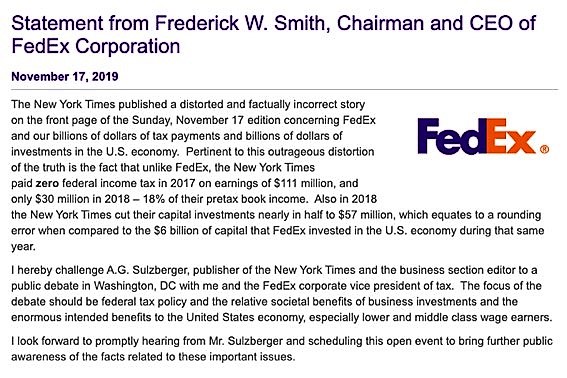To receive a free full-text email of The Zeitgeist whenever we publish to the website, please sign up here. You’ll get two or three of these emails every week, and your email will not be shared with anyone. Ever.
How FedEx Cut Its Tax Bill to $0 [New York Times]
“The company, like much of corporate America, has not made good on its promised investment surge from President Trump’s 2017 tax cuts.”
“Nearly two years after the tax law passed, the windfall to corporations like FedEx is becoming clear. A New York Times analysis of data compiled by Capital IQ shows no statistically meaningful relationship between the size of the tax cut that companies and industries received and the investments they made. If anything, the companies that received the biggest tax cuts increased their capital investment by less, on average, than companies that got smaller cuts.”
“FedEx’s financial filings show that the law has so far saved it at least $1.6 billion. Its financial filings show it owed no taxes in the 2018 fiscal year overall. Company officials said FedEx paid $2 billion in total federal income taxes over the past 10 years.”
Fact check: TRUE.

Fact check: ALSO TRUE.
I think FedEx is one of the crown jewels of Western capitalism. This is a company that has invested (and continues to invest) billions of dollars in the US economy, creating (and continuing to create) tens of thousands of jobs.
I think FedEx can spend whatever tax cut windfalls they might receive in whatever way is best for their shareholders. There’s nothing unfair or wrong about that.
I think Fred Smith is one of the crown jewels of Western capitalism, too. His personal story is an inspiring one of risk-taking and patriotism.
I think Fred Smith, entrepreneur and risk-taker, can be as rich as he wants to be, and there’s nothing unfair or wrong about that, either.
But here’s the thing …

If I hear another lecture from Fred Smith and his fellow billionaires on trickle-down tax cuts and the “benefits to the United States economy, especially lower and middle class wage earners”, I’m going to lose it.
If I hear another lecture from Jay Powell and his fellow centimillionaires and decamillionaires at the Fed on trickle-down monetary policy and the “benefits to the United States economy, especially lower and middle class wage earners”, I’m going to lose it.
OK, boomer.
What’s the boomer world?
It’s a world where our current President is an on-the-make billionaire, and our most recent former President seems hell-bent on becoming one. A world where lawyers from Citadel write our securities regulations, and VPs from Boeing run our Defense Dept. A world where corporate managers can become billionaires – not by innovation or risk-taking – but by stock-based comp at scale. A world where asset managers can become billionaires – not by invention or outperformance – but by asset-gathering at scale.
It’s a world that has been systematically hollowed out for decades, through Narrative capture of monetary policy, trade policy, antitrust law, mass media and the tax code.
“Yay, trickle-down economics!”
It’s a bipartisan thing. It’s a Zeitgeist thing.
And the 2017 Tax Cuts and (LOL) Jobs Act was just the latest smiley-face punch in the gut.
Worried about losing your freedom to a redistributive State? I think you’ve already lost it.
Just not in the direction you thought.


This is an unintended consequence of central banks saving the world. Theoretrically, capitalism is self-correcting but without the unpleasant part of the cycle it doesn’t work. It isn’t working and it is going to get ugly…
This is a natural consequence of what happens when systems involving people grow in complexity to the point where they are no longer understandable by the participants in the system. To make up our deficiencies in understanding we create ideas about how the system should or ought to work. We ascribe to it moral qualities (a fair system) or semi-intelligent attributes (the system will adjust). Then when the raccoons emerge and take advantage of the lovely trash bins that the system has deposited all over the place, we react with indignation and “quelle surprise” simply because we forgot that the raccoons were there in the first place.
So we try and design systems to deracoonify, and those systems too end up being run by raccoons, who cleverly have now put on different suits that allow them to be respectable, like the regulator suit, or the civil servant suit.
We keep looking to the system for answers, when we probably should spend a lot more time looking in the mirror.
If you make it all about money - why not? If you have a patently corrupt government at all levels-why pay taxes you don’t have to?
Off the top of my head, I can’t think of any large cap US business that has been more consistently and thoroughly critiqued by Wall Street analysts for spending TOO MUCH on capex in the last 2 years.